Ratio Legis Penerapan Beban Pembuktian Terbalik Di Indonesia
(Komparasi Hukum Pidana Indonesia Dan Hukum Pidana Islam)
DOI:
https://doi.org/10.32332/istinbath.v18i1.3288Keywords:
Ratio Legis Reverse Proof System, Indonesia, Comparative Legal StudyAbstract
The reverse proof is the burden of proof to the suspect of a crime. In principle, the application of the reversed burden of proof is against the universal law of proof and is not following the presumption of innocence. However, the reverse burden of proof contained in the Law on the Eradication of Criminal Acts of Corruption, and the Law on the Prevention and Eradication of the Crime of Money Laundering, with a Legis Ratio of the two types of crimes classified as white color crimes, and extraordinary crimes, is right. Because it can be ascertained that, when the verification process takes place, law enforcement will have difficulty in proving the guilt of the perpetrators of the crime. In Indonesia, the application of the reverse burden of proof is applied to corruption and money laundering crimes which are limited to the Eradication of Corruption Crimes and Money Laundering Crimes. In Islamic law, the application of the reverse burden of the proof system is included in the ta'zir category which is based on government policy (ulul amri). The inverse burden of proof system is implied in the Qur'an, Surah Yusuf, Verses 26-29. However, in applying the reverse proof system, the jurists use istihsan in making ijtihad on contemporary social problems. Thus, both in the perspective of general law and Islamic law, the reverse proof is something that is specifically allowed, for criminal cases where it is estimated that there will be difficulties in proving it.
Keywords: Ratio Legis Reverse Proof System, Indonesia, Comparative Legal Study













